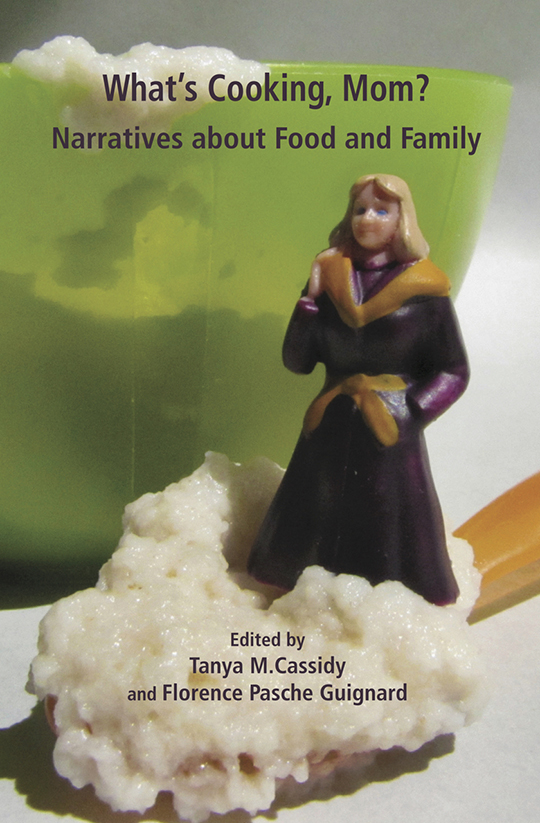
Price: $29.95
Page Count: 208
Publication Date: December 2015
ISBN: 978-1-926452-18-0
“The essays in What’s Cooking, Mom? explore the multiple ways in which gender, culture, health, and the food industry affect the work of feeding families. By highlighting the personal stories and perspectives of mothers, this collection makes important contributions to feminist mothering studies, food studies, and contemporary discussions about food and family.”
—Heather Hewett, Associate Professor of English and Women’s, Gender, and Sexualities Studies, The State University of New York at New Paltz
“Drawn from life, the stories collected in What’s Cooking introduce students and general readers to just how complex, troubling and rewarding, mothers’ responsibilities for feeding their families can be. This is very rich fare!”
—Donna R. Gabaccia, Professor, Department of Historical and Cultural Studies, University of Toronto
“The editors and contributors have broadened the range of stories and experiences related to provisioning our bodies; we hear from mothers who have faced and overcome challenges such as feeding a child with celiac disease, as well as mothers who do not cook. Readers will find the narratives intrinsically interesting because we all must eat, although not all of us write about the experience with the passion of these authors. The book puts the cooking, feeding mother at the centre, while avoiding the moralizing discourses so often associated with the subject of motherhood and food.”
—Penny Van Esterik, Professor Emerita, Anthropology, York University, Toronto
“It’s exciting to see What’s Cooking explore in such pointed way the vibrant intersection between Motherhood Studies and Food Studies, even as it works to redress the disturbing absence of maternal voice in discussions of feeding work.”
—Amber Kinser, Professor and Chair of Communication & Performance, East Tennessee State University
Acknowledgements
Introduction
Florence Pasche Guignard and Tanya M. Cassidy
Part I
Positionality, ethics, and reflexivity
1.
Talking Back (to Myself)
Christin L. Seher
2.
It’s a Gluten World Out There:
A Celiac Mother’s Socialization Story
Joyce L. Mandell
3.
Revisiting and Reconstructing Maternal Sustenance: An Autoethnographic Account of Academic Motherhood
Sarah N. Gatson
4.
Meeting Myself for Dinner: Negotiating the Multiplicity of Positionality While Feeding the Family
Lorin Basden Arnold
5.
Production, Process, and Parenting: Meanings of Human Milk Donation
Tanya M. Cassidy and Conrad Brunström
Part II - Memories, responsibility, and authority
6.
Feeding Hannah
Robin Silbergleid
7.
I Am Feeding My Children the Best of Organic and Healthy Food So Why Do I Feel So Guilty?
B. Lee Murray
8.
When Feeding Your Family Is a Full-Time Job
Kari O’Driscoll
9.
My Mother Did Not Cook
Dominique O’Neill
10.
Fortress of Confection: Lessons from My Yankee Grandmother
Erica Cavanagh
11.
Dreams of Exclusive Breastfeeding: Mothering without Enough Milk
Grace M. Cho
Part III - Negotiating intercultural maternal experiences
12.
Lebkuchen Lesson:
Teaching Our Children through Traditional Foods
Emily Weiskopf-Ball
13.
Scary Candy, Goldfish Crackers, and Kale Chips: Feeding and Parenting
Our New Canadian Daughter in Toronto
Florence Pasche Guignard and Thomas Guignard
14.
Wa and Wa-shoku:
Mothering and Food as an American in Japan
Wendy Jones Nakanishi
15.
The Rebellious Bento Box:
Slapdash Western Mothering in Perfectionist Japan
Meredith Stephens
16.
An Ethnographic Analysis of U.S. Culture and Caribbean Food Practices
Rosa Soto and Sharmila Pixy Ferris
17.
The Cooking Lesson:
Identity and Spirituality in the Lives of Hindu Refugees in America
Dorothy Abram
Contributor Biographies
After completing her PhD in the comparative study of religions at the University of Lausanne (Switzerland), Florence Pasche Guignard joined the Department for the Study of Religion at the University of Toronto (Canada) as a postdoctoral researcher in 2012. Her work engages issues at the intersection of religion and gender, embodiment, ritual, media and material culture. Food and foodways also count among her research interests. Previously, she has published on topics such as religion and ornaments in devotional Hindu poetry, on religion and toys, games and dolls, and on religious rituals and representations on video sharing website. Her current research project, entitled “Natural Parenting in the Digital Age. At the Confluence of Mothering, Religion, Environmentalism and Technology” is supported through a fellowship of the Swiss National Science Foundation. Her most recent and forthcoming publications focus on the intersection of religious discourses with motherhood, pregnancy, childbirth and breastfeeding, with a particular focus on ritual and media.
Tanya M. Cassidy is a Canadian sociologist who received her doctorate from the University of Chicago. Recently she has been awarded a prestigious EU Horizon 2020 Marie Sklodowska Curie Fellowship housed at the University of Central Lancashire (UCLan). She continues to be an Affiliated Researcher in the Department of Anthropology at the Maynooth University in Ireland where she held her Cochrane Fellowship, as well as an adjunct Professor with the Department of Sociology, Anthropology, Criminology at the University of Windsor, Ontario, Canada. Her doctoral research, from the Department of Sociology at the University of Chicago, USA, concerned a socio-cultural study of gender, family and alcohol in Ireland. Since then she has lectured in both Sociology and Anthropology in Ireland, England, and Canada. In 2005 she took a career break that has resulted in a new research trajectory that connects her long-standing theorisation of consumption and identity with a more urgent public policy agenda concerning premature birth and infant feeding.


